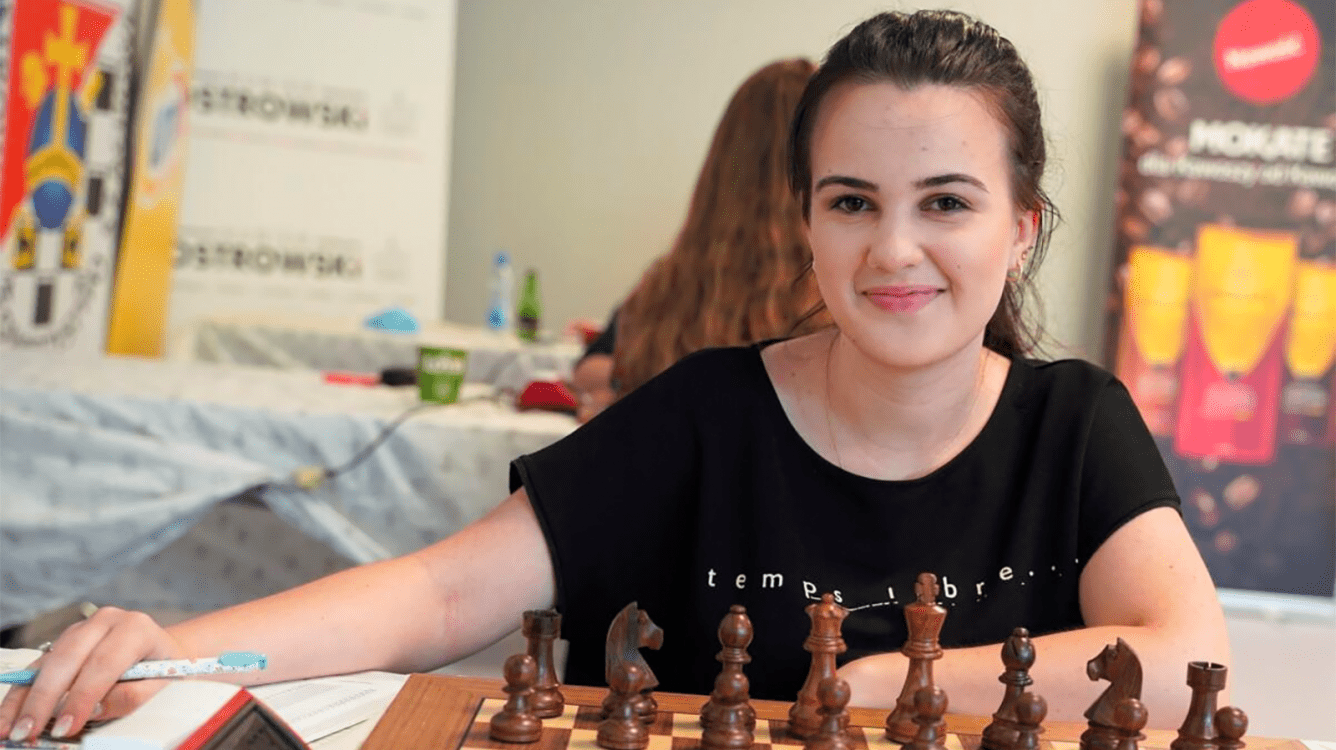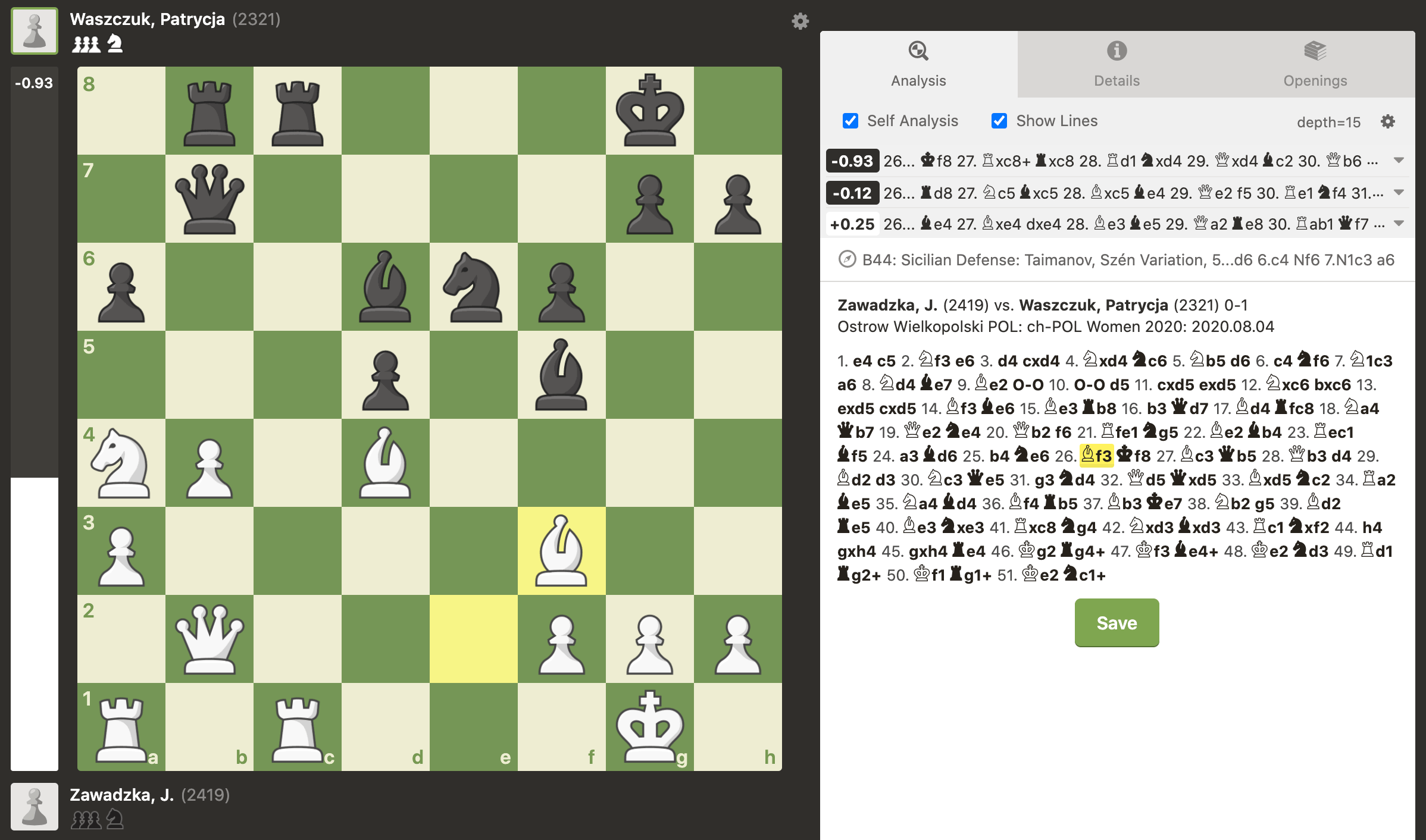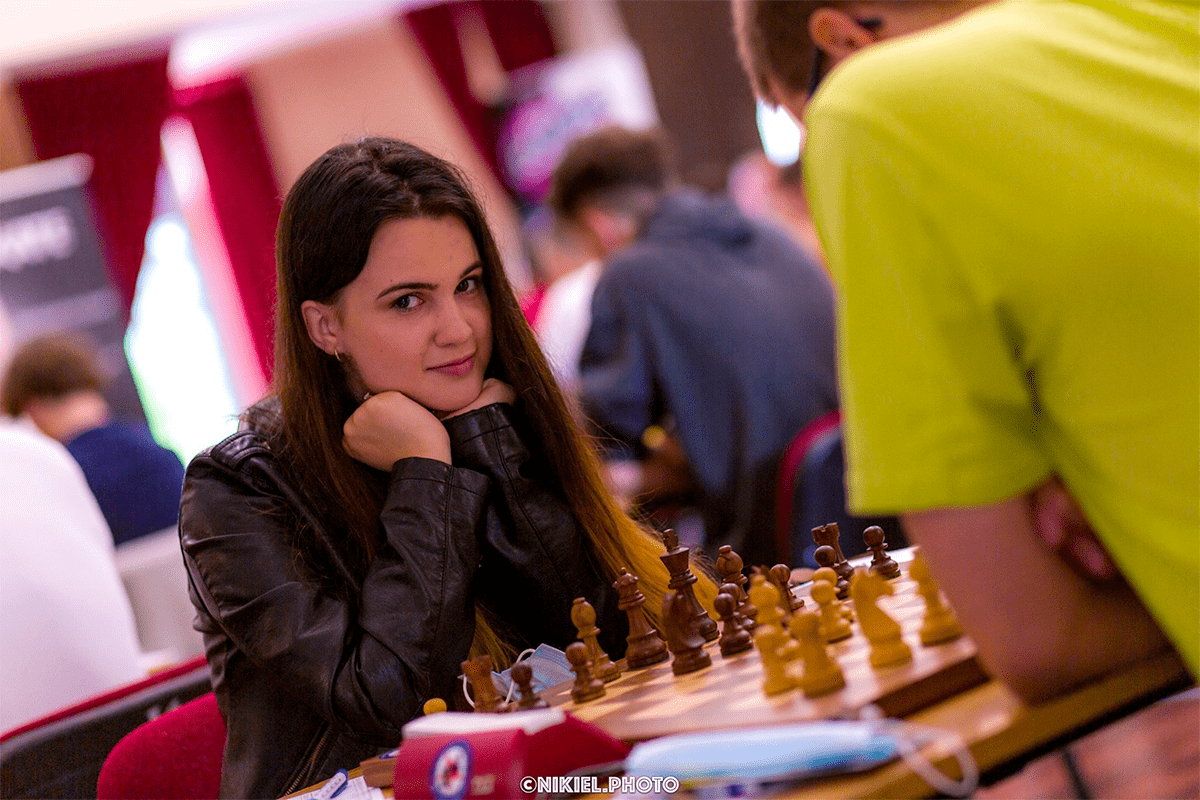
Polish Player Suspected Of Cheating Gets 2-Year Ban
The Polish Chess Federation has banned 17-year-old WFM Patrycja Waszczuk for two years from competitive chess for allegedly using a phone during play. The father of Waszczuk has appealed the decision, claiming the evidence is circumstantial.
Waszczuk, who is the current Polish U18 Girls Champion, was removed from the Ustron Chess Festival on August 16, 2020 for possessing an electronic device. The result of her round-four game was changed from a draw to a loss. There was a strong suspicion that she used a phone during play, which has now led to the two-year ban.
The penalty by the Polish Chess Federation was announced in a document (in PDF here) by the Commission for Awards and Discipline, which is the result of an investigation over the last two months. The verdict is based on a combination of factors, summarized by IM Piotr Nguyen on the Polish chess website Infoszach and translated here:
- Ms. Patrycja W. lied to the arbiters: IA (International Arbiter - the highest international arbiter class) [name redacted] in the presence of IA —— [name redacted] and the President of the Silesian Chess Association, Mr. —— regarding her electronic devices.
- She used the telephone in the restroom, as evidenced by the eyewitness testimony of Ms. ——.
- She admitted that she had a second telephone, admitting this fact twice, which was confirmed by the testimony of witnesses: IA ——, ——.
- She refused to show her purse, which is confirmed by the testimonies of the following witnesses: IA ——, ——, President of the Silesian Chess Association, Mr. ——.
- She tried to leave the playing room, which is confirmed by the testimonies of the witnesses: IA ——, ——.
- She tried to hide the phone in the playing room, which is confirmed by the statement of witness Ms. ——.
- She used the phone during other competitions, which is confirmed by the testimony of a witness, the coach of the women's national team, grandmaster, Mr. ——.
- The analysis of the defendant's games shows the use of a computer program, which is confirmed by the testimony of the coach of the women's national team, ——.

Training camp
Since the spring of 2020, several Polish players have suspected Waszczuk of receiving external help during games. WFM Michalina Rudzinska posted her thoughts on Facebook, while IM Klaudia Kulon was interviewed by Onet, a widely read news website in Poland.
WIM Alicja Sliwicka, who attended a training camp in July 2020 with Waszczuk and other players, provided the following comments to Chess.com via email:
"During a training session for the women's national team, we played a small tournament for all camp participants. In the first round, I played against Waszczuk, who had permission from the coach to write down her moves on her mobile phone because she claimed she did not have any piece of paper or pen. I spotted she put the moves into a chess mobile app instead of a mobile notebook. Patrycja won that game as easy as her next two games against GM Monika Socko and coach GM Marcin Dziuba.
"When I was in time trouble, I stopped writing moves down, so after the game, I asked Patrycja to show me her mobile phone because I wanted to copy the moves from her notation. First, she offered help by telling me all moves, but when I preferred to see the app, she refused to show it, claiming that some error occurred and she could not restore her notation. After three games, our coach intervened and did not allow her to use a mobile phone anymore. Then she scored only one point in the next 12 games with a much lower level of play."

Sliwicka also mentioned an experience when the players had to solve puzzles: "During the camp, the participants had to solve chess puzzles by themselves. In one of those tests, everybody used the full time (40 minutes) to solve puzzles except her, who finished them after a few minutes and had all the correct answers. Her behavior during the test was very suspicious too. While solving the next test, she was observed, so she tried to solve it without any help. She did not write any solution and left her paper empty."
Some participants in the Polish U18 Girls Championship in Szklarska Poreba in March 2020 had already suspected Waszczuk because of her frequent visits to the restroom, while showing a "super-GM level of play." Waszczuk won with 7.5/8 when the tournament had to be ended prematurely due to the coronavirus pandemic.
The analysis of Waszczuk's moves, which were an important part of the commission's verdict, included this tournament and also her games from the 2019 European U16 Girls Championship in Bratislava where she took clear first with 7.5/9.
Polish Women's Championship
Before the Ustron Chess Festival, in early August, Waszczuk participated in the Polish Women's Championship, where she scored 4/9. However, even from the first round, the other participants started suspecting her.
Waszczuk's move 26...Kf8, in her game with the four-time Polish women's champion WGM Jolanta Zawadzka, is well known in the Polish chess scene and has become a meme on social media. It was played after fewer than three minutes of thinking:

"During the game, I couldn't believe it is a good move," Zawadzka told Chess.com. "I was trying to find why it was wrong, why it was not stupid. After the game, I saw it's the computer's first move. Even grandmasters couldn't find it."
Zawadzka experienced more odd behavior from her opponent, such as playing the opening moves quite slow and, after returning from the restroom, quickly finding the best moves.
"All cheaters should be banned forever if there's proof without any doubt as it's too damaging for the sport," said Zawadzka. She agreed that at the women's championship there was no clear evidence of foul play: "Everybody knows it, but nobody can prove it."

Chess.com also spoke to WIM Anna Kubicka, who played Waszczuk in the third round of the championship. Like Zawadzka, Kubicka said that it was the combination of strong moves by Waszczuk and her regular visits to the restroom that raised the other players' eyebrows:
"After the opening, I decided to play quickly to not allow her to go to the toilet. Every time she made a move, she wanted to stand up, but I was blitzing. At some point, it became too much, and she went to the toilet even though it was her move. She came back, and for the next five moves, she went back to the toilet four times, in about 15-20 minutes. I didn't know what to think and tried to find moves that she couldn't have analyzed."

In subsequent rounds, Kubicka and other players started to write down the number of times Waszczuk went to the restroom during her games while afterward trying to check those moments with the evaluation of the computer. They felt that the strength of her play in the tournament corresponded with those restroom visits.
Metal detector
The tournament organizers did arrange for a metal detector to check whether players were carrying electronic devices—a measure that has become more and more common at chess tournaments. However, there were doubts by players about the quality of the machines and how they were used. Sometimes, the detector would make a sound, but players would still be allowed to play without further checks.
Kubicka: "Sometimes players would show their jewelry, and it was fine. But there was also one round when Patrycja didn't have an explanation as the machine went off close to her pants, and the arbiter still let her play. Admittedly, they were not using the best machines."
The atmosphere during the championship was very tense, and most players were constantly distracted by the suspicions. GM Monika Socko stated that she couldn't sleep the night before and after her game with Waszczuk.

Ustron Chess Festival
The Ustron Chess Festival, where Waszczuk was banned from the tournament, started only a couple of days after the national championship. The event was played under the honorary patronage of FIDE Vice President Lukasz Turlej. He confirmed most of the facts as stated in the document by the Commission for Awards and Discipline.
Turlej told Chess.com that, apart from the phone Waszczuk handed to the organizers, she had a second one in her purse: "They caught her, and she admitted having a phone with her. When the arbiter wanted to inspect her purse, she said no. Then she said: 'Yes, I have a phone in there, but I don't want to show it.'"
Waszczuk had been asked more than once if she had another electronic device with her. After admitting she did have a phone, she left the playing hall and came back with her grandmother, says Turlej:
"The grandmother said it was not a phone but a power bank, and that she had used the word 'phone' because of stress."
Turlej added: "It is such a pity. This tournament was supposed to be famous because of the honorary patronage and visit of Anatoly Karpov and a great number of accompanying events. I have to say, it was one of the best chess events I have ever seen. But unfortunately, the wider public knows the Ustron Chess Festival because of this incident."

Chess24 revealed that the witness who saw Waszczuk using a phone in the toilet was WFM Katarzyna Dwilewicz. She said that during the fourth round, she followed Waszczuk to the restroom, chose the toilet next to hers, and then started to stand up on the toilet seat:
"My heart was beating so fast when I was climbing on the toilet! I was all shaking. Finally, when I climbed up high enough, I looked down. I saw her sitting down. She was using a phone, and I am sure of what I saw. I saw clearly the phone screen. It was exactly the same position she had had on the board a while ago. She was checking variations from a chess program."
FIDE Ethics Commission
An English version of the commission's report has been sent to FIDE. Turlej provided a statement on the legal procedures, in which he notes:
"When requested by a member federation, the Ethics and Disciplinary Commission will attribute general validity in FIDE to national decisions on violations of FIDE Ethics and Disciplinary Code, if adequately motivated and decided in compliance with the fundamental principles of law and fair trial."
FIDE Director General Emil Sutovsky confirmed that both the FIDE Fair Play Commission and the Ethics Commission will examine the report. He expects a formal decision to be taken within a few weeks.
In the case of GM Igors Rausis (now using the name Isa Kasimi), who was caught with his phone during a tournament game, he was stripped of his GM title and received a six-year ban from FIDE. Earlier, Georgian GM Gaioz Nigalidze also lost his GM title and was banned for three years, also for using a phone in a restroom during play.
The maximum ban from the Polish Chess Federation for offenses during open tournaments is three years but two for minors; therefore, Waszczuk was banned for two years. If she had been caught during the Women's Championship, the penalty would likely have been higher as the maximum ban for offenses at that type of tournament is 10 years.
Appeal
Mariusz Waszczuk, the father of the player, has appealed the commission's decision. In an interview with Onet, he states:
"There was a hunt on my daughter. Terrible hate has been poured out on her. We're suffering terribly. People see us as cheaters, and that's not the case. There is no evidence of this. This case is a conspiracy by two direct rivals of Patrycja."
According to the father, Patrycja never admitted to having a second mobile phone with her. He also claims that the second device found in Ustron was a power bank.
Waszczuk senior, who has hired a lawyer, suggests that procedural mistakes have been made by the Polish Chess Federation. He claims that they didn't get proper access to documentation and case files. He also questions the actions of the chairman of the Commission for Awards and Discipline, who is said to have spoken about the ongoing case on Facebook.
While the Polish Chess Federation has three months to decide on the appeal, the case could end up in court. One question is how Dwilewicz's revelation that she caught Waszczuk red-handed, a testimony from just one eyewitness, will be handled.
Chess.com couldn't reach a representative of the federation for a comment. Speaking to Onet, the president of the federation, Radoslaw Jedunak, said: "This type of fraud is very difficult to detect. After all, it is difficult to say what someone could do in the toilet if they went out to it. However, if someone goes to the toilet several times during one game, and then beats one of the best players, and then beats another strong opponent, it gives food for thought."


